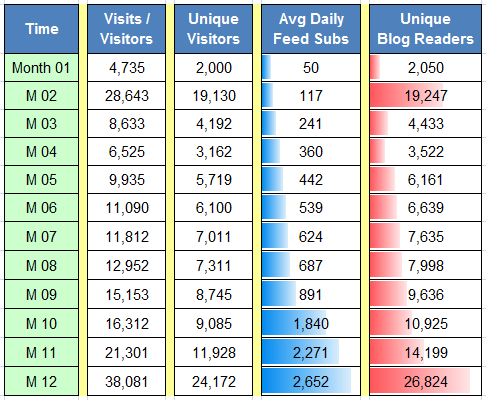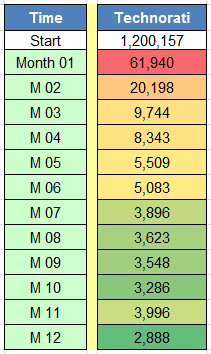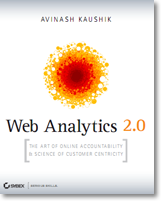[There is a updated version of this post, please check it out: Blog Metrics: Six Recommendations For Measuring Your Success.]
 On May 13th our son Chirag turned three and yesterday this blog turned one. I am more excited about Chirag's birthday but my family members might disagree. :)
On May 13th our son Chirag turned three and yesterday this blog turned one. I am more excited about Chirag's birthday but my family members might disagree. :)
When this blog was four months old I had a blog post titled: How To Measure Success Of A Blog. It was my first attempt at providing a framework that pulled together different data sources to provide a holistic view of how to crack this tough nut.
It has been eight months since then and I wanted to use my blog numbers for the entire year to revisit the framework and tweak it a bit to make it better based on recent learnings.
My hope is that you'll find specific ideas, metrics and tools that you can use to measure how your own blog (personal or professional) is doing.
Measuring success of Social Media in general is an evolving art (not quite a science yet) and you have to be up to the challenge of both thinking a bit differently and be ok with leveraging several different tools.
Here are the important metrics / KPI’s (Key Performance Indicators) for measuring success of your blog:
- Raw Author Contribution (posts & words in post)
- Unique Blog Readers (content consumption – Unique Visitors & Feed Subscribers)
- Conversation Rate (measuring success in a social medium)
- Technorati “Authority� (measuring your impact on the world!)
- Cost (what!)
- Return on Investment (what's in it for you/your business)
Let's visit each recommendation in detail……
# 1: Raw Author Contribution.
If you want to achieve success, you've got to pay your dues. This KPI measures the answer to the question: "So what have you actually contributed?".
My recommendation is to measure two simple things: 1) Number (trend) of posts in a given time period and 2) Words in posts.
I admit that neither of those two is a proxy for quality, but it is a foundational metric that might hold some answers if other metrics below are "sub optimal".
You can get these stats from your blog log files or in my case I use the General Stats plugin for wordpress.
My stats: 12 months, 97 posts, 160,851 words.
Success? It depends. In my case the goal was to have fewer posts but with higher quality and lots more content in each. If I graphed the words per post over the last 12 months you'll see a nice gradual upward trend, and if I correlate that with the trend in comments per post (also going up) it would give me a primitive indicator of quality. So I would consider this KPI to be indicate initial niceness.
For your blog you'll watch the trend and watch for that trend to go in the right direction. As you can imagine it is quite ok for you to have lots of small posts with fewer words, watch the trend and for no large gaps (absence) in that trend.
# 2: Unique Blog Readers.
So how many people read your blog? And is it trending in the right direction? There is a tiny challenge with measuring this.
None of the current crop of accessible web analytics tools (except for perhaps Visual Sciences) track RSS feeds, which is a important content consumption methodology for blog readers. The RSS measurement tools, like feedburner, are just beginning to provide traditional onsite metrics.
My recommendation, for now, is for you to compute Unique Blog Readers by yourself by combining two metrics that are measured slightly, only slightly, differently. Unique Visitors, from your web analytics tool, and Feed Subscribers, from your RSS tool.
Unique Blog Readers = Unique Visitors (to the blog) + Average Feed Subscribers (consuming your feeds).
Here is how the trend looks for Occam's Razor for the first year…..

Some people who subscribe to your RSS feed probably visit your blog from time to time, so there is slight over counting. Also Feed Subscribers is probably even better at measuring uniqueness than Unique Visitors using a web analytics tool like ClickTracks or Google Analytics or Omniture or WebTrends or HBX etc.
But here is the important point: Look at trends.
Over time if your trend is going in the right direction you are doing fine. See the last two columns above.
While I think that looking at the combo metric is optimal, if you wanted to use just one then you could use the growth of your RSS Feed Subscribers.
For the most part it is immune to vagaries of one time events that might impact your visitor stats (see Months 2 and 12, column four above), and it shows great commitment from your readers to sign up for your feed.
The only "funny" number in the feed stats for me was when a post got on the digg home page. Notice that otherwise the trend is nice and steady growth, the bump you see is when Google started reporting Google Reader data.
Success? For this blog I am absolutely surprised and grateful. I never imagined that a year later I would have approx 20k visits from 12k unique visitors (month 11) or that I would have approx 3,000 feed subscribers. It is a case of you all just showing up and me very grateful to all of you! Thanks!
For your blog you want a nice steady growth for the Unique Blog Readers metric. If yours is a professional blog I encourage setting of goals, say 10% growth every month, and then measuring against goals. It can be unbelievably motivating.
# 3: Conversation Rate
Blogs are a social medium and they facilitate excellent two way conversations. For your blog measure the Conversation Rate (not conversion! :)).
Average Conversation Rate = # of Reader Comments / # of Posts
For my blog the Conversation Rate is 13 (approximately 13 comments per post).
That is 1,523 minus 115 (a recent post got too many comments so I am eliminating it as an anomaly) times 0.9 (since approximately 10% of the comments are mine) divided by 97 (number of posts).
For me the most awesome part of the experience is the content you all contribute. Notice you all have written as much in comments, approximately 120k words (eliminating approx 31k from my comments), as I have in posts (161k)!!
Success? My goal when I started the blog was to get approximately 3 comments per post, but since I was meeting the goal at mid year I raised it to 5 comments per post. So I would deem this as a success. But it is important to stress that this is your contribution to me meeting the goal, if it were not for your willingness to engage in the conversation this would not happen.
For your blog set a goal for this most social of social mediums. It is also a great reflection of your content creating a level of engagement with your target audience. As with other metrics watch the trend.
# 4: Technorati “Authority� (benchmark externally).
Technorati elicits mixed feelings, but I am a fan. If you just stick to your blogging and write great content then there is no better authority, at the moment, that will provide you a metric to compare your impact on the blogging universe.
It is a simple metric, there are 70 million blogs and if they were ranked from one to seventy million then what would your rank be.
There are two things about Technorati that I like very much: 1) You have to consistently stay relevant, links to your blog are counted on a six month rolling window so you can be good once and then enjoy the ride. You have to keep producing good content that people will link to. 2) It is democratic. Unless you are part of a content network etc, you will have to earn every link the hard way and your peers vote with their links. Can't beat that validation, I think that is why we are hooked on Technorati (we all want to be loved!).
Here is the trend for my blog over the last 12 months….

That last point might be bit of an anomaly, I expect the ranking to settle back to around 3,500 in six months.
Success? The blog started on May 15 and my goal was to have my Technorati ranking be under 10k by end of 2006. I was happy to reach that goal in October (thanks to all of you in the blogosphere). I should probably have a new goal now. I'll shoot for a under 3,000 Technorati ranking by end of 2007 (it is important to note that meeting that goal is much harder than is might seem).
For your blog, personal or professional I recommend a similar goal setting exercise. Here is a great way to do that: Do a quick Technorati search for all the blogs in your own ecosystem. Create a goal to beat the highest listed blog in that ecosystem in x months, where x is aggressive. :)
# 5: Cost.
What is the cost to your life, business, time of your blog? Compute it and you'll be surprised.
I use a simple formula. I only blog at most twice a week (in the last few months it has bee just once a week which is why some of the growth numbers above are surprising to me, maybe if I blog once a month my numbers will shoot through the roof!). But my computations I still spend approximately 25 hours per week on blog and directly blog related work (research, replying to email, creating draft posts, etc etc).
Assuming my time is worth $75 per hour….
Annual cost of the blog = 25 * 4 * 75 * 12 = $90,000.
If this was a real job that is how much I would have earned. And that is not even computing the opportunity cost (which if you are a business committing to blogging you should absolutely also compute).
That is a huge number, even at $75 per hour. It makes me carefully evaluate what I am trying to accomplish with this resource (and if it is really worth not watching The Daily Show, or any TV for eight months).
Success? I had no goals for this and I don't think that is the real cost of my investment in the blog, it is probably much higher. While I blog for the love of it, I recommend that we should put a number on the cost of what it takes to blog. In multiple ways it can be insightful.
Interestingly this is an addiction and I don't think that the investment is going to go down. But atleast I know, and so should you.
# 6: Return on Investment.
The question you are trying to answer is: "So what do I get out of it all?". Sure it sounds selfish but it is important.
 Let us get this out of the way: If you are a "real" blogger, :), you probably do it for the love of it and you will do it even if you had to give up sleeping. All because it makes you happy. And there is no price that you can put on a ROI of happiness. If you are one of those (and I am!) then for a moment leave that aside.
Let us get this out of the way: If you are a "real" blogger, :), you probably do it for the love of it and you will do it even if you had to give up sleeping. All because it makes you happy. And there is no price that you can put on a ROI of happiness. If you are one of those (and I am!) then for a moment leave that aside.
You (and I) should track ROI. Use what you have: job offers you get, proposals for marriage, increase in salary at work, sales driven to your ecommerce website from the blog, reduction in the cost of PR because now your blog is so omnipresent and a big bull horn (for businesses this is big), number of paid conference speaking engagements, and so on and so forth.
I don't have a ROI number to share with you this time around. I do have a new consulting gig that I just started and the blog had something to do with it, but it is too soon to compute ROI on that. I did get a offer to write the book (Web Analytics: An Hour A Day), but because I wanted to keep the blog pure all that money is going to charity.
Success? The next time I do this I'll compute ROI and show what I get for a investment of $90k per year into this blog, by including some numbers. But I have to admit that I would probably keep doing this even if the ROI is not positive, especially if you all continue to engage in the conversation with me like you do (because what you teach me through your comments is work more than $90k per year).
I hope that you'll find this post helpful in measuring the success of your own social media efforts (be they blogs or other such efforts).
What do you all think? Did I cover everything? Is there a metric you use that I have not highlighted above? Have tips for me on how better to compute ROI? Please share your feedback and critique via comments.
[Like this post? For more posts like this please click here.]







 Via
Via 














Most blogs are still very young.
Who knows how many shall stand the test of time. The self-regulating community shall decide.
When successful, ROI has probably many intangible dimensions.
Happy birthday Occam’s Razor !
Keep up the outstanding contribution !
Nice post as usual,
Im particularly interested in this post because like many others, I have a blog. One part that you don't touch on too much is your measurement of RSS feed subscribers.
I can see that you use feedburner, but if you ever feel a bit more adventurous I have a post that details how to count RSS subscribers with that bit more accuracy.
Have you thought about doing anything like this, or do you find feedburner detailed enough?
Thanks
Matt Hopkins
http://www.webanalyticmatt.com
hmmmm ….. it is really making me think.
Till now I have been using blog for my satisfaction alone. To express my anger for the politicians for not taking proper steps, to drop the feelings of love and friendship, and to write the dream business ideas etc. are the major goals.
You made me think deeper now. You know what, you have already made me think deep by pulling me into Google Analytics. After using Google Analytics, I got so much of information about my blogs that surprised me lot. I found most of the people who reads my blog are in US (not India, not Nepal …. surprised); most people in Europe open my site for less than one min (I want to improve this anyhow, but don't know how) while people in US open it for 5.36 min (both average numbers).Etc etc and lots. Now I think on those metrices when I blog … ohh, isn't it making my blogs more marketable and less informative. If it is, then all blame to you, Kaushik.
Anyway, thanks for the great insights. I am loving my new role. It has been a great learning exercise for me with you and your blog.
Bhupendra
Great Article,
It seems like this week's trend in the blogosphere is how to establish better social media metrics with blogs being the focus. Robert Scoble and Jeremiah Owyang both had similar posts earlier this week, however, this is much more detailed.
Although I too am suspect of technorati's authority, I'm proposing 3 main metrics for measuring the success of the current blogging initiative that my company is doing. They are:
1) Technorati's "authority" – I really like your goal setting.
2) Conversation Index – see stowe boyd. I'm just thinking about complicating things by proposing a possible scale of this (I'm on the fence on this one)
3) RSS Subscriptions – However, I like the fact that you have included unique visitors and I now that I think of this, it's a much stronger measurement when you combine the two.
I almost think there should be a fourth that you did not mention – what about sites like Digg? I think given the pure democracy of this, it could almost be a sort of "extra credit". I know this is weird, but I believe services like this should also be considered in a blogs long term success.
Thanks again, I love the blog.
Best Regards,
Mark Krupinski
As a brand-new blogger, this post provided some super valuable information. And, as a direct marketer who believes wholeheartedly in measurement, I really like how you've quantified success.
Congratulations on your excellent first year!
Matt: I have to admit that I am pretty happy with Feedburner, they take care of everything and I don't have to worry about anything and they provide pretty decent metrics to boot. The only metric I wish they would hand out was Readers (which they compute by measuring how many people actually read your posts – vs just subscribing to them). I understand why that data is a upsell and paid content. :) Your post outlined a excellent suggestion and something that I would love to try at some point, though I was a bit worried about the impact on search engines.
Bhupendra: I would be careful about using Time On Site for a blog simply because of the way web analytics tools compute it currently. The time you spent on the last page you viewed in your session is something that all the tools can't compute. So on a blog since many posts are on the home page your readers could spend 15 mins on that page and leave and your tool would report nothing. This is unique to a blog experience. But you can use other metrics, enjoy your journey!
Mark: The Digg suggestion is a great idea, I do personally think of it as extra credit even though I realize with so many people trying to game the digg system it is going to get harder to get anything there.
I am a bit more fond of stumbleupon.com. I find that it continues to be a lot more democratic and, selfishly, many of this blog's posts get stumbleupon'ed. There is not a crazy traffic spike like digg but a good amount of traffic, I find they read more on the blog. So I do give extra credit to posts that get stumbleupon'ed! :)
Thanks for the suggestion.
-Avinash.
PS: Bonus Data: Here are the top referrers of traffic to Occam's Razor in the last year:
# 1: Google (24.5%)
# 2: http://www.stumbleupon.com (10.7%)
# 3: http://www.digg.com (4.2%)
# 4: digg.com (3.7%)
# 5: del.icio.us (2.2%)
# 6: Yahoo! (1.8%)
# 7: http://www.bloglines.com (1.2%)
# 8: analytics.blogspot.com (1.0%)
# 9: http://www.veen.com (0.8%)
# 10: http://www.netvibes.com (0.6%)
Happy birthday Occam's Razor! Wow your stats just keep on going up. I guess it's because of your knowledge that you are generously sharing with us all. Have you thought about giving extra credits to more frequent commenters on your site – a bit like seomoz does with their thumbs up/thumbs down and moz points (but it sucks that they are trying to get people to pay for their premium content now). I have always thought that blogs are a bastion of "free" freedom of speech and in a very democratic way those that share their knowledge and the wisdom the most will rise to the top of the traffic pile – hence your high stats :)
BTW, will I be able to buy your forthcoming book on amazon.co.uk?
Loving your blog as always,
Marianina
The intangible aspect of the BLOG is that it adds to your credibility. Your insightful comments make others want to come back, builds your brand and influences whether they will buy your next book or seek you out for your day job. The blog helps make you a "Guru" (I know you are not thrilled with that term, but I could not think of another one).
The learnings from the BLOG posts and the feedback you get improves your wisdom and therefore your expertise. The fact that you can even get to ROI metrics at all seems to me to be icing on the cake.
Suzanne is very lucky as a new blogger to have discovered your post and your advice! I'm a seasoned blogger, but a total newbie to Google Analytics and Web and Social Media analytics.
I found your framework extremely useful. I went through your post step-by-step and applied it to my own blog. What I discovered was that the numbers were not as important as the reflections and questions it generated for me about how to improve my blog.
I work mostly as a trainer and I blog and create video blog posts and screencasts about how nonprofits can use technology (particularly social media) for social change. My blog helps develop curriculum and materials for teaching.
I am currently working on a screencast for NTEN about Google Analytics and Nonprofits. As newcomer to analytics, the software routinely made me feel stupid. However, with the new interface and the experience of going through your framework, I'm actually beginning to grok it!
Farris Khan above mentions the intangibles impact on you — how blogging encourages reflection and improves your expertise. I found the same for my blog. But there is even yet another intangible that probably can't be measured in metrics — the outcomes or results your readers have been able to achieve from reading your blog.
Thank you and Happy Birthday to your blog and son!
Amazingly awesome post. But $75/hr? Add a zero, and it is still a deal for any company that desires a Web Analytics consultant with your real-world experience, especially if they follow 10/90, Emperor.
8^)
Judah
Interesting post, which I will refer to in a speech I'm giving today on how to measure success in social media. However, you're really only talking about measuring activity not outcomes. If you're blogging to satisfy your own need for expression, these are great measure. But if you're trying to engage employees or customers in a conversation, and improve your relationships, these metrics fall short.
Avinash,
I left a long comment on Beth Kanter's blog.
Read it here:
http://beth.typepad.com/beths_blog/2007/05/measuring_your_.html
I don't agree with Katie's comment, "…these metrics fall short."
Process outcomes are important. They are easy to measure. Process outcomes precede impact outcomes.
Process outcomes? Process outcomes are the stuff, the activities – bloggers write blogs – to change something. Some folk call process outcomes outputs. I demure because without process you will be without outcome.
I'd like to hear Katie's thoughts about impact outcomes.
Catherine
Thank you for starting the outcomes conversation and stepping out in public in a risky way.
Katie: The framework outlined here does cover Outcomes, perhaps I should have been a lot more explicit.
Rather than stay at Outcomes my recommendation is to measure ROI (essentially Outcomes / Cost).
So take these types of Outcomes from the existence a blog (quoting from the post above):
* Job offers you get
* Proposals for marriage
* Increase in salary at work
* Sales driven to your e-commerce website from the blog
* Reduction in the cost of PR because now your blog is so omnipresent and a big bull horn (for businesses this is big)
* Number of paid conference speaking engagements
* and so on and so forth.
Each of these Outcomes can have a monetary value associated with it. Take that, divide that by your Cost (recommended metric # 5) and you have ROI. Your CFO will not just be happy you measured outcome, they will give you a warm hug that you went one step ahead and computed ROI. :)
Each of the other outcomes can also be measured, albeit with some creativity. For example: engaging employees / customers in a conversation can be measured with recommended metric # 3, Conversation Rate. If you want to do this well you would do two extra things:
1) Separate your comments by different sources (customers, employees, friends etc) and measure Segmented Conversation Rate.
2) Also read the comments and give them a quality score (5 = good conversation, 3 = ok conversation, -5 = blog is causing detractors!). This allows you to measure the quality of the conversation (using hopefully good judgment) along with quantity.
Measuring social media is a imperfect for now, but that is lots that can be measured with a small amount of effort.
Thanks so much for sharing your feedback.
-Avinash.
Thought you might be interested in some of the additional threads of conversation bouncing around educational technology/online learning blogospheres …
http://elearningtech.blogspot.com/2007/05/measuring-blog-success.html
Happy birthday to one of the nicest and smartest bloggers in the field.
I'm preparing to launch a blog of my own, and your insight really gives me something to think about. It's encouraging, too.
Specifically, the metrics you propose are enough to provide insight, without being overly complicated (perhaps the hassle of collecting the data from multiple sources is enough).
Also, your metrics are directly related to your goals. With respect to Katie's comments, if your blog has a more specific purpose, for instance to generate leads for a consultancy, then you would put a conversion metric on that. If you're like me and want to help others and celebrate geekiness, then measuring conversation and readership is plenty.
By the way, I can think of no better metric to measure user "engagement" than proposals for marriage… ;)
Actually I've noticed that some blogs, even with low traffic and low conversation rate, rank very high on search engines. This is due to their original content….meaning they don't just link to other stories and provide their own take on them.
Instead they contribute materially in providing original content.
Avinash, great post as always. I am finally catching up on your last 6 posts. One question, and I might have missed it if you've covered it in the past. Wondering if you have similar ideas on how to measure success of commentary that takes place outside of your own blog. Like how to measure the sentiment of your company or site externally. I know there are companies like Buzzmetrics, etc that do something like that, but would love to hear your thoughts!
Congrats on the book being out!
-Jim
Avinash,
Nice, detailed post. I was hoping if you can share with us on the number of drafts you create for each post before publishing them on live? I like your clean style of writing.
Congratulations on passing the year benchmark. Pixelheadonline just passed that bench mark as well, but I must say my stats are not nearly as impressive as yours, but I am still happy with how it is proceeding. Keep up the good work…you've been stumbled & Dugg.
Hi, I really like your Blog about success. Very cool stuff.
I am in the midst of creating a success website myself. Check it if you get a chance.
Take care –
Avinash, You never told how to get the initial readers to your blog as at that time no one has linked to ur blog.
Wow this is awesome!
This is again a great article, and still relevant after all these years.
I too feel like at the start of blogger we need to consider these all tips to measure our effort on our blog. I'm putting all my effort on Allinformer.com. And I know these tips are game changing for me.
Thanks kaushik.
I know I'm super late to this post, but it's still so relevant and helpful after a lifetime on the internet (12 years!). Given that it's 2019 now, have you added any other metric to your framework?